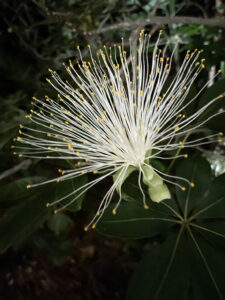April comes to a close and as it does, we reach the next spoke in the wheel of the year, as this evening brings Walpurgis Night, named for St. Walpurga, whose feast day is the First of May. In the Celtic tradition, the day is known as Beltane. It is the cross quarter day that helps us spring to summer here in the Northern Hemisphere, and the direct opposite spoke of the cross quarter day that helps us fall to winter, which is Samhain, or Halloween. The fall to winter brings descent, life burrowing down beneath the earth, while the spring to summer brings ascent, life springing forth from the earth. It is an aspect of the everlasting mysteries of the planet and its place in the universe: we know these things so well, for we witness them each year with the planet’s revolution around the sun, and yet how these things have all come to pass still has the power to leave us breathless. The very names given to these days are shrouded in mystery, too, for their pronunciations are, for most of us, not of our tongue, and what seems apparent is not: Beltane is pronounced bowl-tan-a; Samhain is pronounced sah-win. Like the names of angels in ancient tongues, to speak the names connects us to a long forgotten past whose embers still smolder.
As such, a fire is appropriate for tonight. In Sweden, there will be bonfires, as well as gravlax and sparkling wine, all through the night. There are traditional songs, like “Maj vare välkommen” (May Be Welcome). We don’t do much celebrating of Walpurgis Night here in the States, but in a place where the extremes between winter and summer are keenly felt, May surely is welcome.
Tomorrow, I will write again with your Convivio Book of Days calendar for May. May be welcome. Summer be welcome. We wish you peace.
Nighttime mysteries abound: our image today is of a Guyana Chestnut blossom in our yard. The blossoms burst forth in spring and summer at about 9 PM in small explosions from pods that are about 4 inches long. There may be one on the tree or there may be ten, but they all tend to pop open at about the same time, filling the night with a spicy air that is most definitely a fragrance of spring and summer, most definitely of this ascending time of year.

Thank you for this beautiful article! That is amazing about that tree!! I’ve never heard of that and I really appreciate you sharing your knowledge! I’m not sure where I read this it might’ve been on this site, but I think the word Beltane also means ‘Bright Fire’ which is kind of a fun thought! Happy brightening!! I am getting a Mosel riesling wine to celebrate!
Sonnenfeuer, Sternengold, Kühlen Mondlichtschein’ – The fire of the Sun, the gold of the stars, and cool moonlight.
Hi Mary Beth, you did not learn that from me, but I thank you for teach it to me. I love the idea of Beltane as bright fire, and feels appropriate. The Riesling is a fine idea for tonight, and thank you also for your blessing. Cheers!
I love this–thanks for the pronunciations. I remember reading about the “bonfires” in a Thomas Hardy novel. I think the Novel may have been The Return of The Native. How I came to be reading that in about 5th grade is unknown, but I went for a long time trying to figure what the bonfires were for. Now I’ll have to find the time of year in that Novel,( which of course I have) but it had to be Fall or Spring.
Riesling is a great idea and then I’ll go my research–LOL bettygray
Cheers, Betty! And I’ve been reading Under the Greenwood Tree, also by Thomas Hardy, but alas, I misplaced my book in the last few chapters. I can’t find it anywhere! Which is not the way things typically go here but which has happened to me twice in the past year with books.
well I’m way off about the bonfires in Return of The Native–it was Nov. more a Guy Fawkes day –too bad
betty gray
Oh don’t worry, Betty, bonfires are a pretty common celebratory event throughout the year!
dear John, thank you always for your posts which inspire and hearten me. I adore your description of Beltane as the spring into summer, and Samhain as the fall into winter. All these years, I’ve never heard it said like that, it’s brilliant! I will borrow it if I might. I just read this: “The name Bealtaine is said to derive from Old Irish, meaning ‘bright fire,'” on an Irish writer’s FB page so your friend Mary Beth is spot on. I am excited about the brightening days and always feel a surge of energy about this “spoke’ as you call it. Maybe I will make a post this year; I have rather missed the rhythm of writing at every turn of the Wheel, but as you know, have been busy writing other things. Blessings of the May to you and yours!
Back when Convivio Bookworks was known as Red Wagon Press, we used to send out two mailings each year to our mailing list of about 50 people, and we called them just that: Spring Into Summer, Fall Into Winter. It was meant to cover all the months of the year to save us some money on postage, but also a manifestation of this very thought about these two opposite sides of the wheel.
Blessings to you and yours, too, Cari, and good luck with all the writing you are doing!
[…] Cutrone, of the Convivio Book of Days, describes this cross quarter day as the time when we spring to summer, just as the opposite cross quarter day […]